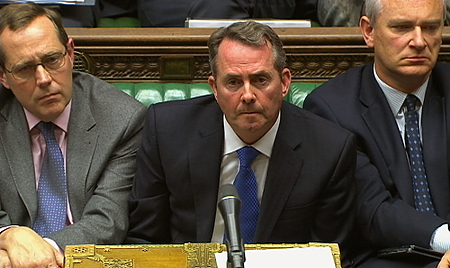
Britain's Defence Secretary Liam Fox (C) speaks to Parliament in London October 10, 2011. (Photo: Parbul TV / Reuters)
Say what you like about Britain’s beleaguered Defense Secretary Dr Liam Fox—and substantial sections of Westminster’s press corps have been doing just that as questions mount up about the proprieties of one of Fox’s closest friendships—he’s well connected. The compact Scot and former medical doctor was once linked by the tabloid press to Australian pop singer Natalie Imbruglia, but until the past tumultuous week his political ties drew more attention than his personal connections. The Atlantic Bridge, a U.K. organization founded by Fox to rekindle the sort of transatlantic special relationship that bound Margaret Thatcher and Ronald Reagan, enhanced Fox’s profile in Washington, giving him an entrée to the Bush White House and its key strategist Karl Rove.
Since British Conservatives came to power in 2010 in coalition with Liberal Democrats, Fox has burnished his international and domestic reputation through his handling of Britain’s Libyan deployment and the rest of the tricky defense portfolio during a time of hefty commitments and shrinking budgets. His 50th birthday celebrations on Sept. 24 attracted a slew of prominent guests including two Prime Ministers, the current incumbent David Cameron and Thatcher herself, these days so frail that she rarely ventures out. Her mark of favor, recorded for posterity in a photograph that also revealed Fox’s unexpectedly flamboyant taste in party shirts, confirmed his position as the leading voice of the Conservative right who mistrust Cameron’s metropolitan, centrist tendencies and yearn for a return to bracing Thatcherite Toryism. As recently as early October, as the Conservative party gathered in Manchester for its annual conference, Fox was fêted not only a government stalwart but a potential successor to Cameron. Now his future looks as uncertain as his sartorial instincts.
The problem threatening to torpedo the Defense Secretary’s career comes in the shape of a tall, baby-faced Briton called Adam Werritty who took it upon himself to distribute business cards bearing the emblem of the British parliament and describing Werritty as an advisor to Fox. These claims, revealed by the Guardian (the same British newspaper that broke the story of the hacking scandal) and later denied by Fox, had gained credibility from Werritty’s frequent appearances at Fox’s side. The 34-year-old once shared Fox’s London apartment, acted as best man at Fox’s 2005 wedding, and was for a time employed by Fox to run the Atlantic Bridge. But that organization, granted charitable status in 2003, ceased activity after Britain’s Charity Commission questioned whether it filled its charitable objectives and has now been wound up by its trustees. Werritty was never employed by the government or by Fox, apart from a short spell in 1998 when Werritty received a stipend from public funds as an intern in Fox’s House of Commons office. So why did Werritty hook up with the Defense Secretary during 18 of the trips abroad the politician has made since taking office? What was the nature of Werritty’s role at some of Fox’s high-level meetings, such as a 2010 “steakhouse” dinner in Florida with General John Allen, who assumed command of NATO forces in Afghanistan in July? On what basis did Werritty enjoy apparently unfettered access to a Cabinet minister?
An inquiry into Fox and into Werritty will attempt to answer these questions. In her interim report, Ursula Brennan, a top civil servant official at the Ministry of Defense, highlights the “gray area” that makes difficult any rulings on where her boss’s official duties end and his personal life begins:
The Defense Secretary’s Overseas visits are complex, often involving brief stopovers en route from one location to another, with meetings being arranged and rearranged at short notice. Some meetings start or finish with personal time, e.g. when the Secretary of State is on holiday and others contain periods of ‘downtime’ for personal relaxation during the busy schedule. Some overseas visits include political engagements. Maintaining an appropriate degree of separation between these elements is complex, but is necessary for reasons of propriety.
Fox has issued an apology—it was, he admitted, “a mistake to allow distinctions to be blurred between my professional responsibilities and my personal loyalties to a friend.” He denied that Werritty had been privy to classified information. Speaking during an Oct. 10 appearance before the House of Commons, Fox also assured his colleagues that Werritty was “not dependent on any transactional behavior to maintain his income.” That oddly phrased statement will be tested as officials look through the client list of Werritty’s three small consultancy businesses and piece together further details of his contacts with Fox.
If Werritty turns out to have profited from the friendship, the hounds of hell—or at least the combined furies of the British press and the Defense Secretary’s political enemies—will catch and dismember Fox. For now he retains Downing Street’s lukewarm support and may yet survive the chase. But the affair raises lingering questions about the judgment of a politician who aimed to strengthen the Special Relationship but let a special relationship endanger his career.

